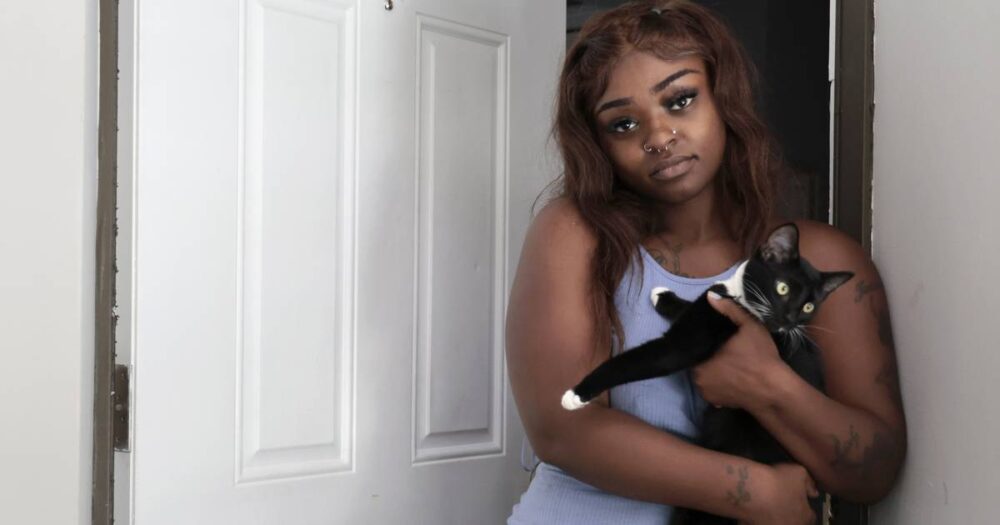Two Cook County landlords are discriminating against Black renters by automatically denying their applications for units if they have any prior eviction history, housing advocates allege in two newly filed legal complaints.
Legal Aid Chicago filed a lawsuit Tuesday against Hunter Properties Inc. over the company’s “No-Evictions Policy” — which states in its application portal that “prior evictions filings will result in denial” of housing applications. The complaint, filed in the U.S. District Court for the Northern District of Illinois, alleges the policy violates the federal 1968 Fair Housing Act by discriminating against Black renters, particularly Black women, since they are disproportionately affected by eviction.
The lawsuit also claims Hunter Properties is excluding tenants based on sealed eviction records, violating Illinois’ Consumer Fraud and Deceptive Business Practices Act, which prohibits landlords from unfair residential leasing practices.
The suit follows a civil rights complaint HOPE Fair Housing Center lodged with the U.S. Department of Housing and Urban Development July 20 against Oak Park Apartments. That complaint alleges the same type of discrimination as Legal Aid Chicago’s case, adding that such discrimination perpetuates and reinforces residential segregation.
The complaint takes issue with a statement that was in application materials posted on the company’s website until Thursday saying that applicants “cannot have a bankruptcy, judgment, eviction, foreclosure, history of late rent payments or short sale.” As of Thursday, the company’s policy statement said applicants ”cannot have an active bankruptcy (can override if discharged for two years), judgment, active eviction (although this can be overridden with proof of resolution), foreclosure, history of late rent payments or short sale.”
HUD confirmed Wednesday it had received the complaint but declined to comment on the timeline for the investigation.
Kate Walz, associate director of litigation with the National Housing Law Project, one of the legal groups representing HOPE Fair Housing Center in the complaint, said the update to Oak Park Apartments’ policy language on its website does not remove the harm the group has done, and there still needs to be clarification around what the new policy means.
Oak Park Apartments did not respond to a request for comment. According to its website, the company owns more than 60 apartment buildings, with 1,500 units in Oak Park and other Chicago area neighborhoods.
Hunter Properties also did not respond to a request for comment. The company manages more than 2,500 apartments in Chicago, according to its website.
The plaintiffs are hoping these legal challenges have local and national implications that allow people to have greater access to housing in the rental market, as they say these are some of the first cases to challenge property owners’ eviction screening policies.
Virginia Baskerville, 28, said she has faced challenges securing housing ever since she was evicted in 2019 from her Washington Heights apartment on the city’s Far South Side after being the victim of domestic violence.
With help from Legal Aid Chicago, she won her eviction case and got her eviction records sealed. But she and her four kids had to live with her mom, two sisters and one of their partners in a three-bedroom apartment for about seven months because she was continually denied housing, as property owners cited her past eviction record.
“It was terrible,” Baskerville said, who has worked temp jobs and now works at a restaurant. “It was too packed in there….That was just like the worst experience I ever had.”
After that, she lived in a Chicago Housing Authority building until its contract with CHA expired, and she was forced to leave. Since November 2021, she has lived in a building in Woodlawn — which did not require an application for its units — and pays $1,450 in monthly rent for a three-bedroom apartment. Baskerville is searching for new housing again because she said her building is infested with roaches and does not always have hot water and electricity.
“This type of landlord is the one I’ll be having to find now,” Baskerville said. “I’m in this little nasty, dirty building because of that eviction. It won’t come off. They can find it, even though it is sealed.”
HOPE Fair Housing Center and Legal Aid Chicago are bringing the complaints in their capacity as organizations that advocate for fair housing access. Individual renters have not signed onto the complaints, something the ACLU of Illinois attributed to a reluctance by people who have suffered harm to be publicly identified.
“The goal of the litigation is to mitigate harm — not force individuals to risk more discrimination,” the ACLU of Illinois, which is representing the groups in their complaints, said in a statement to the Tribune.
Michael Chavarria, executive director of HOPE Fair Housing Center, said it is “unnecessary” to block access to housing for people who can afford it simply because they were the subject of an eviction filing, regardless of what the outcome was, the basis of the filing or how long ago it was.
“[Oak Park] has invested so deeply in ensuring a diverse and integrated community,” he said. “To see a housing provider interfering with that work is just deeply concerning, and so our goal is to put an end to that.”
Dennericka Brooks, director of the Housing Practice Group at Legal Aid Chicago, said her clients often do not avail themselves of their rights as tenants out of fear of having an eviction on their record, since landlords harass their tenants with the threat of eviction.
“We witness structural racism, discrimination and how that thwarts the health and stability of our clients and perpetuates poverty,” Brooks said. “Our housing stock is already limited the way that it is, and the mere filing of an eviction should not be the reason that people are denied housing.”
In addition to the ACLU of Illinois and the National Housing Law Project, Legal Aid Chicago is being represented by the American Civil Liberties Union and the law firm Mayer Brown. HOPE Fair Housing Center is being represented by the same groups except for Mayer Brown.
The legal groups conducted an analysis of Cook County Sheriff’s Office data finding that while 33% of Cook County renters are Black, about 56% of people served with an eviction notice or evicted by the Sheriff’s Office between September 2010 and March 2023 were Black.
According to a Tribune analysis of Cook County Sheriff’s Office data, most evictions in 2022 took place on the South and West sides in majority Black and Latino communities, trends that line up with national data showing racial minorities are more likely to face eviction. The pandemic disproportionately affected racial minorities, who were more likely to experience hardships such as job loss and illness.
An eviction filing does not necessarily result in an eviction. Local and national data show eviction filing rates are much higher than executed evictions. Many tenants either leave right when they receive an eviction notice or are not evicted once the eviction process plays out.
Walz, with the National Housing Law Project, said there has been success in Cook County and at the federal level to prohibit discrimination against renters with criminal histories, and these two legal complaints aim to bring similar change for people with eviction records.
“We are failing in ensuring that everyone, regardless of race or gender, has a home,” Walz said. “We need the type of national attention to this that has increasingly been recognized and followed as to criminal records screening.”
The Cook County Board of Commissioners approved the “Just Housing” amendment to the Cook County Human Rights Ordinance in 2019, making it illegal to refuse to rent or show a property to people with certain criminal records.
So far, one similar lawsuit challenging eviction record screenings under the Fair Housing Act has played out. In 2017, the National Housing Law Project filed a lawsuit on behalf of a tenant who was rejected from an apartment in Seattle based on a prior eviction filing.
The case settled the same year. The housing provider agreed to have a policy giving every person an opportunity to submit an application, regardless of their eviction history, and made a payment to the client, according to Sandra Park, senior staff attorney at the ACLU’s Women’s Rights Project.
Brooks from Legal Aid Chicago wants to see similar reform in Cook County.
“It’s time that we see people as people and not an eviction record or filing, because it tells you absolutely nothing about their ability to be good tenants,” she said.
“We want to see the long-term effects as a way to help in the desegregation of housing in Chicago. We want families to have an opportunity to have actual housing mobility.”
ekane@chicagotribune.com






